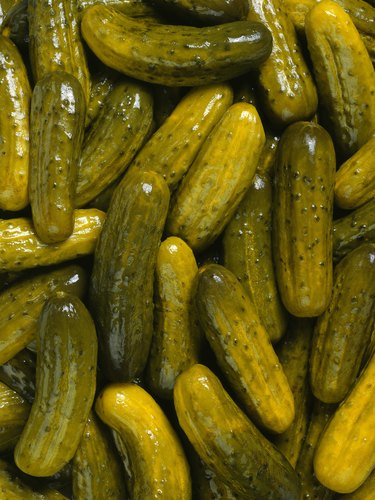
When Eastern European immigrants began coming to New York at the turn of the 20th century, Jewish immigrants from Russia and Poland introduced pickles to American palates. These pickles were prepared in the kosher manner, meaning that they were prepared in a rabbi-approved fashion that adhered to Jewish dietary laws. Due to their similar origin, Polish and kosher dill pickles resemble one another in preparation, making it difficult to distinguish between the two -- that is, until you taste them. While kosher dills are made with garlic, Polish dills are often made with more pickling spices, giving you a zesty, peppery pickle.
The Perfected Pickling Process
Video of the Day
Pickling has been around for centuries as a way of preserving food that will spoil without human intervention. Vegetables and some meats can be pickled through the process of immersion in an acidic liquid such as vinegar or saltwater-based brine. The process involves submerging cucumbers into a pickling solution and allowing the natural occurrence of lacto-fermentation transform them into pickles. Lactic acid forms within the brine, pickling the green vegetables. The exact ingredients used in the pickling process determine the pickle's variety.
Video of the Day
What are Kosher Pickles?
Kosher pickles come in two varieties: full sours and half sours. Full sours are cucumbers that have been left in the pickling barrel for five to six weeks, or the full fermentation time. They turn a rich olive green when ready for jarring and shipment to stores. In contrast, half sours are removed before they have completely fermented. They are bright green and very crisp, with a mild and fresh flavor. The biggest difference today between kosher pickles and other pickles is the presence of garlic in the pickling process.
Should You Pick a Polish Pickle?
Polish pickles are similar to kosher dills. In fact, the Jewish pickle makers who made their pickles in the kosher manner in late-1900s Manhattan, were often from Poland. Polish pickles are made with kosher salt, water, dill and cucumbers. Polish pickles often contain more fresh dill in the pickling process than kosher dills. They also tend to be the color of pickled green olives. In modern times, Polish pickles often have spices such as black pepper, red pepper or mustard seeds added to the recipe.
Keeping Kosher with Pickles
Today the term kosher, when applied to pickles, typically denotes a dill pickle made with garlic. The term comes from the Jewish practice of making kosher food. To be kosher, the pickles must be processed in a stringent manner that adheres to kosher dietary laws. Some kosher dill pickles are also kosher in the dietary sense. Such pickles will be jarred with the Orthodox Union Kosher Certification symbol on the label. If the symbol is absent, there is no guarantee that your kosher pickles are manufactured in an approved kosher manner.
- The Shiksa in the Kitchen: Quick Pickles
- Bon Appetit: Glossary of Pickle Terms
- Pickle Packers International - I Love Pickles: Pickle Primer - A Glossary of Pickles and Pickled Peppers
- Mt. Olive Pickles: Frequently Asked Questions about Mt. Olive Pickle Company
- Bon Appetit: The Ultimate Straight-Up Regular Kosher Dill Pickle Recipe
- Reform Judaism Online: Cooking - Pickles & the Discovery of America